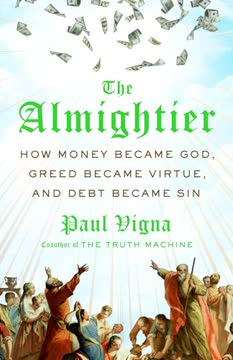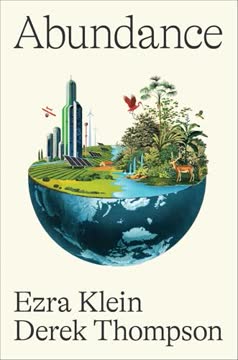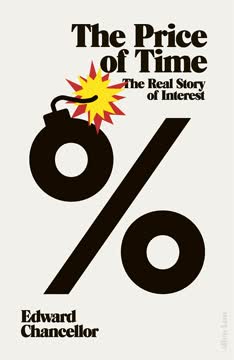Key Takeaways
1. Money's Ancient Roots: A Divine Tool Turned Deified Force
Monetary systems don’t work because of the intrinsic value of gold, or dollar bills, or bitcoins. They work because of our faith in them.
Collective belief. Money, fundamentally, is not a tangible reality but a collectively agreed-upon system, deriving its value solely from human faith. This concept originated over five thousand years ago in Mesopotamian city-states like Uruk, where temple officials devised standardized measurements, called shekels, to track commodities like barley and livestock. These early accounting systems, born in the heart of religious and royal authority, intertwined money with divine legitimacy, making debts to the temple essentially debts to the gods themselves.
Temple's centrality. The temple served as the economic engine and ultimate financial intermediary of ancient societies, managing vast resources and arbitrating disputes. This fusion of money, power, and religion meant that increasing wealth and expanding empires were seen as tangible signs of the gods' approval, reinforcing the idea that money carried a celestial imprimatur. The infrastructure around money, from ancient basilicas to modern financial buildings, is designed to reinforce this faith, making central bankers akin to "money shamans."
Greed's ancient origins. This early system, while efficient, quickly revealed a "dark side": money became a source of power and wealth in itself, fostering "philargyros" or "money-loving"—what we now call greed. Despite condemnations from philosophers like Aristotle and religious figures like St. Paul, who called it "the root of all evil," greed flourished, driving individuals to accumulate wealth and leading to persistent conflicts between kings, temples, and private creditors over control of the monetary system.
2. The Debt Jubilee: A Lost Mechanism for Societal Balance
The amargi was magnanimous, but it was also practical.
Ancient debt relief. In ancient Mesopotamia, the persistent problem of multiplying debts, which ruined farmers and led to indentured servitude, necessitated a radical solution: the "amargi," or debt jubilee. Kings like Enmetena would unilaterally declare the cancellation of all personal debts, freeing bondservants and restoring land to families. This practice, later codified in the Hebrew "iobeleus" (Leviticus), was a crucial "safety valve" to prevent societal collapse and maintain a productive populace.
Jesus's radical call. The ministry of Jesus Christ, or Yeshua, can be reinterpreted as a powerful call for a debt jubilee during a period of Roman financial crisis in 33 CE. His sermon in Nazareth, quoting Isaiah's proclamation of "the year of the Lord's favor," directly invoked this ancient tradition of debt forgiveness. His dramatic act of chasing moneychangers from the Jerusalem temple was not merely an act of vandalism but a symbolic, full-scale rebellion to obliterate debts and restore God's law of balance.
Suppression of jubilees. Despite its historical importance and practical benefits, the practice of debt cancellation faded as private creditors gained power. The execution of figures like the Spartan king Agis and Yeshua, who dared to demand such relief, sent a clear message: the creditor class would not tolerate challenges to their authority. This marked the disappearance of the amargi, leading to a system where money, issued by kings and managed by temples, operated alongside a powerful, largely unchecked private market.
3. Greed's Rehabilitation: From Sin to Societal Benefit
“Avarice, sometimes, is beneficial,” Antonio says.
Post-plague paradigm shift. The Black Death, which decimated Europe's population in the mid-1300s, shattered the feudal system and traditional ways of thinking, opening minds to radical new ideas. Amidst this upheaval, a group of Italian humanists, obsessed with rediscovering ancient Greek and Roman knowledge, began to challenge the Church's long-standing condemnation of avarice. This intellectual ferment laid the groundwork for a profound re-evaluation of greed.
Bracciolini's bold argument. Poggio Bracciolini, a papal secretary and avid manuscript hunter, penned "De avaritia" (On Avarice) around 1430, a dialogue that controversially argued for the societal benefits of greed. Through the character of Antonio, Bracciolini posited that all human endeavors, including those of priests, are driven by the desire for money. He contended that avarice, far from being destructive, was essential for civilization, fostering industry, building public works, and enabling charity by creating surplus wealth.
The "magnificent man." This new ethos suggested that the wealthy, by pursuing their self-interest, inadvertently contributed to the common good, building "magnificent houses, distinguished villas, churches, colonnades, and hospitals." This reinterpretation of Aristotle's "magnificence" allowed merchants and bankers to justify their pursuit of profit as a virtuous act, aligning personal ambition with societal betterment. This intellectual shift, born in mercantile Florence, marked a critical turning point, transforming greed from a vice into a potentially beneficial force.
4. The Magnificent Merchant: How Wealth Became a Virtue
No single person before or since—not even today’s captains of industry—embodied Bracciolini’s ethos of beneficial greed as fully or as successfully as Cosimo de’ Medici.
Cosimo's empire. Cosimo de’ Medici, a Florentine banker and close friend of Bracciolini, became the quintessential "magnificent man," embodying the ethos of beneficial greed. He transformed his family's bank into a multinational leviathan, expanding its reach across Europe through innovative partnership structures and a sophisticated system of bills of exchange that cleverly circumvented usury laws. His wealth and influence made him Florence's de facto ruler, a "king in all but name."
Public works as justification. Cosimo masterfully leveraged his vast fortune to fund an unprecedented array of public works, including churches, convents, libraries, and artistic commissions, such as Donatello's iconic "David." These lavish expenditures not only cemented his reputation and endeared him to the populace but also served as a public demonstration that his wealth, though accumulated through "avarice," ultimately benefited society. This model provided a blueprint for future capitalists to justify their own pursuit of riches.
A new social contract. Cosimo's success, combined with the intellectual arguments of Bracciolini and the Church's eventual embrace of this new ethos (exemplified by Pope Nicholas V), shattered the old constraints on commoners. Greed, once reserved for the ruling classes, became an acceptable, even celebrated, ambition for everyone. This shift unleashed an explosion of entrepreneurial spirit across Europe, laying the foundation for what would become capitalism by making the pursuit of wealth a legitimate and even virtuous endeavor for all.
5. The Protestant Ethic: God's Blessing in Accumulating Wealth
“How very profitable this fable of Christ has been to us through the ages,” he once remarked to a colleague.
Church's industrial greed. The Church, under popes like Leo X (Giovanni di Lorenzo de’ Medici, Cosimo's great-grandson), fully embraced the ethos of beneficial greed, transforming it into an industrial-scale operation. Leo X's pontificate was marked by profligate spending, funded by aggressive revenue generation, including the notorious sale of "indulgences"—absolution for sins in exchange for donations. This blatant corruption, epitomized by figures like Johann Tetzel, sparked widespread outrage.
Luther's rebellion. Martin Luther's 95 Theses, nailed to a church door in Wittenberg in 1517, directly challenged the Church's abuses, particularly the selling of indulgences. While initially aimed at reform, Luther's arguments quickly evolved into a broader attack on papal authority, stressing a direct connection between individuals and God. This rebellion, fueled by centuries of resentment against church corruption, ignited the Protestant Reformation, splitting Europe and fundamentally altering the religious landscape.
Calvin's divine justification. John Calvin, a key figure in the Reformation, further refined the relationship between wealth and faith. His doctrines of "providence" and "predestination" asserted that God controlled every aspect of life, and that honestly earned wealth was a "sign of God's blessing." This theological framework, later termed the "Protestant Work Ethic" by Max Weber, transformed the pursuit of wealth into a virtuous, God-willed endeavor, provided it was not used for personal pleasure but for the common good and God's glory.
6. Colonialism's Engine: Unmitigated Greed and Its Human Cost
Oh, lost people; oh, diabolical greed; oh, bad conscience; oh, unfortunate soldiers; how you did not understand in how much danger you walked, and how wasted your lives and without tranquility your souls!
Gold, God, and Glory. With the old trade routes to the East closed by the Ottomans, Europe's newly legitimized appetite for wealth turned westward. The era of colonialism, driven by the intertwined motivations of "gold, God, and glory," unleashed an unprecedented explosion of unrestrained greed. Papal bulls like the "Inter Caetera" effectively granted European powers perpetual ownership of newly "discovered" lands, providing a divine license for conquest and exploitation.
Devastation of the Americas. Explorers like Christopher Columbus and Hernando de Soto, driven by an insatiable quest for gold, ruthlessly exploited the natural resources and indigenous populations of the Americas. This led to widespread genocide, not only through superior European arms but, more catastrophically, through the introduction of diseases for which native populations had no immunity. The population of the Americas plummeted from an estimated 50 million in 1500 to just 8 million a century later.
Slavery's economic roots. The insatiable demand for labor on European plantations in the Americas, particularly for sugar and tobacco, led to the development of a uniquely brutal system of chattel slavery. As native populations died off and European indentured servants proved economically unfeasible, colonists turned to Africans. As historian Eric Williams argued in "Capitalism and Slavery," this system was primarily an economic necessity, with racism emerging later as a justification for the inhumane treatment required to maintain "the deity of increased production."
7. The Invisible Hand: Secularizing Morality in Economics
By pursuing his own interest he frequently promotes that of the society more effectually than when he really intends to promote it.
Critiques of commercialism. The rampant greed and vast inequalities generated by Europe's new commercial society, exemplified by financial crises like the Mississippi and South Sea Bubbles, sparked a powerful intellectual backlash. Philosophers like Montesquieu and Jean-Jacques Rousseau condemned the extreme individualism and inherent injustices of a system that sacrificed the many for the benefit of the few, arguing that it led to societal breakdown and despotism. Rousseau's "Discourse on Inequality" was a damning indictment of this "New Europe."
Smith's defense of markets. Adam Smith's "The Wealth of Nations" (1776) emerged as the definitive defense of this commercial system, reframing economics in purely secular, scientific terms. Smith argued that the "division of labor" was the engine of productivity and prosperity, leading to a more abundant society where even the poorest enjoyed more "necessities and conveniences of life" than "savages." He systematically dismantled the power of organized religion and corrupt governments, positioning commerce as a superior system for widespread prosperity.
The divine invisible hand. Smith's most famous concept, the "invisible hand," though only mentioned once in "The Wealth of Nations," was fully developed in his earlier "The Theory of Moral Sentiments." Here, he explicitly linked it to "Providence" (God), arguing that individuals, in their "natural selfishness and rapacity," are "led by an invisible hand to make nearly the same distribution of the necessaries of life" as if the earth were equally divided. This provided a powerful, quasi-religious justification for self-interest, absolving individuals of moral responsibility by attributing societal benefits to divine design.
8. America's Godhead: Money as the Nation's Guiding Principle
Money, in a word, is what separates people, and protecting moneyed interests is the first order of government.
Post-revolutionary chaos. Following the American Revolution, the fledgling United States faced severe economic instability, including widespread debt among veterans and farmers, culminating in events like Shays's Rebellion. This uprising, a "colonial debt jubilee," terrified the nation's creditor class, highlighting the government's inability under the Articles of Confederation to protect their interests and wealth. This fear became a primary catalyst for the creation of a stronger central government.
Constitution's economic foundation. Charles Beard's "An Economic Interpretation of the Constitution of the United States" controversially argued that the Constitution was primarily designed to protect the economic interests of merchants, money lenders, and large plantation owners. James Madison, the "father of the Constitution," explicitly stated in the Federalist Papers that regulating "various and interfering interests" (i.e., moneyed factions) was the "principal task of modern legislation." This established money, rather than equality or God, as the nation's de facto godhead.
Wild West capitalism. With a philosophy encouraging greed, a burgeoning financial infrastructure (like the New York Stock Exchange), and minimal regulation, 19th-century America became a "Wild West" of capitalism. Speculators like Leonard Jerome and industrialists like John D. Rockefeller amassed unprecedented fortunes through ruthless self-interest, often at the expense of workers and the public. This era solidified the belief that the accumulation of wealth was a sign of divine blessing, further entrenching greed as a celebrated virtue.
9. The Almightier's Zenith: Capitalism as the New Religion
What the great religious epoch of the seventeenth century bequeathed to its utilitarian successor was, however, above all an amazingly good, we may even say a pharisaically good, conscience in the acquisition of money, so long as it took place legally.
Weber's "de-magic-ation." Max Weber, in "The Protestant Ethic and the Spirit of Capitalism," argued that science had "de-magic-ated" the world, replacing religious meaning with emotionally hollow rationality. He contended that capitalism, born from the Protestant Work Ethic's fusion of money and religion, became a new moral system, providing purpose in a disenchanted world. Weber saw capitalism as a virtuous system, rooted in a "pharisaically good conscience in the acquisition of money," where wealth accumulation was a duty willed by God.
Rand's Objectivist gospel. Ayn Rand's "Atlas Shrugged" (1957) pushed this idea to its extreme, presenting capitalism as a self-contained religion where greed and selfishness were the sole virtues. Rand, a refugee from Soviet communism, rejected all forms of altruism and collective responsibility, advocating for absolute laissez-faire capitalism as the only system allowing individuals to pursue their desires. Her iconic symbol, a solid-gold dollar sign, explicitly replaced the Christian cross, signifying money as the ultimate object of worship.
Money's enduring power. Even in the ostensibly godless, anti-capitalist Soviet Union, money proved indispensable. Despite Marxist predictions of its disappearance, the Soviets found it impossible to abolish currency, eventually creating a gold-backed ruble to stabilize their economy. This demonstrated money's deep embedding in collective consciousness, even in a system designed to eradicate it. By the 20th century, money had fully ascended to become "the Almightier," the primary organizing force in society, replacing traditional religion and shaping virtually every aspect of human life.
10. Reclaiming Control: Restoring Balance in a Post-Scarcity World
It is, in fact, our moral imperative to change it.
The need for change. The historical trajectory of money, from an ancient accounting tool to a deified force, has created a world of vast inequality and systemic instability. As Jacob Coxey's 1894 march for jobs demonstrated, the friction between creditors and debtors, and the demand for a more equitable system, is a recurring theme throughout history. In a rapidly changing "post-scarcity" world, where enough resources exist to meet everyone's basic needs, it is a moral imperative to re-evaluate and restructure our relationship with money.
Cultivating altruism. To restore balance, we must revive the "golden rule"—"do to others what you'd want them to do to you"—a universal principle found across cultures and religions. This means cultivating altruism, not as a replacement for individual ambition, but as a necessary counterbalance to unbridled greed. Whether through charitable giving, volunteering time, or simply embracing cooperation ("sunergos," "harambe," "e pluribus unum"), individuals can actively work to make society more equitable and compassionate.
Radical financial reset. Beyond individual action, systemic change is crucial. This includes capping interest rates, recognizing excessive rates as "usury" that destabilizes society, and exploring alternative banking models like government-backed banks or FedAccounts. The most audacious proposal is a modern, worldwide debt jubilee: printing new money to pay off the global $300 trillion debt, thereby freeing up trillions in cash flow, stimulating the economy, and correcting historical injustices, particularly for heavily indebted nations. This would require careful management of inflation and temporary global price controls, but it offers a path to avoid inevitable financial collapse and unlock unprecedented economic potential.
Last updated:
Review Summary
The Almightier explores how money evolved from a simple tool to a powerful force shaping morality and society. Vigna traces this transformation through 5,000 years of history, examining religion's role in legitimizing wealth accumulation. Readers found the book informative and thought-provoking, praising its accessible writing and historical insights. Some criticized its scope as too broad and its proposed solutions as underdeveloped. Overall, reviewers appreciated the book's challenge to reconsider our relationship with money, though opinions varied on its effectiveness in fully exploring the topic.
Similar Books
Download PDF
Download EPUB
.epub digital book format is ideal for reading ebooks on phones, tablets, and e-readers.












